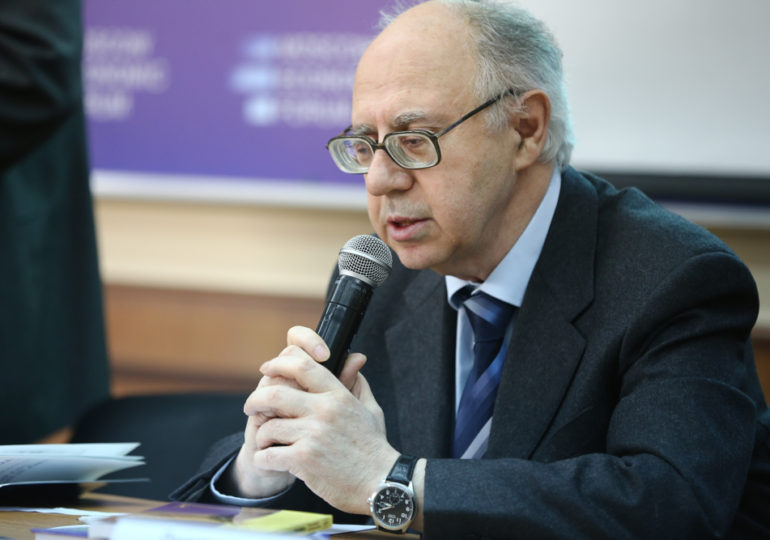
Measures to Overcome the Crisis and Further Develop the National Economy
What are the ways to overcome the economic crisis caused by the pandemic and oil price shocks? We asked George Kleiner, Head of the Department of Institutional Economics, for his recommendations on how to address the current economic situation. The key measures to overcome the crisis are grouped in the areas of economy and governance.
The economy is no longer a system.
The principal challenge for the economy in the post-crisis period is its reboot at all levels. The economy must transform from an archipelago of poorly connected regional, sectoral and domain-specific enclaves into a single national economic system. The economy should become a kind of ‘system of systems’, and it is far from that today.
The economy needs greater coherence, including between functional and institutional components. There is a need to find a balance between the forces of competition and potential cooperation, the processes of innovation and standardisation, economic efficiency criteria and social welfare limitations.
The economic reboot will require a shift away from a number of established doctrines, the practice of non-critical borrowing and adaptation mechanisms for resolving social and economic issues in Russia. This reboot should not rely on a paradigm of rapid development. Rather, it should be based on one of organic self-development that combines both external targets and internal evolution patterns.
Macroeconomic stability
Easing of requirements for inflation targeting. The key requirement for price policy at the macro level should not be to limit price growth but rather to balance prices in sectoral, regional and dynamic spheres. This will ensure macroeconomic stability, including investment flows. There should be a price balances on the national economy level (see the Framework of Single Level Prices). Excessive price volatility can cause highly volatile fluctuations in investment, which contravenes macroeconomic stability and reduces the average efficiency of investment activity.
Higher requirements for consistency and continuity of strategic decisions at the macro level are needed. Federal regulations should be subject to expert review for consistency with adopted regulations and decisions. Inconsistency will lead to a decrease in cost efficiency for economic support and a decrease in trust between economic agents and the authorities.
Control over the macroeconomic balance can be considered a ratio between the project sector of the economy (short- and medium-term investment projects), the object sector (enterprises with an unlimited life cycle), the process sector (systems that ensure the dissemination of innovations, information, inventory and material values, mental models, etc.) and the environmental sector (infrastructure systems that ensure the coherence of the economy).
There is also a need for limitation of the employer-initiated dismissals for the next six months. Each case of dismissal from employment at the initiative of an employee should be examined by the Rostrud with a view to analysing whether the employee is actually resigning voluntarily. Labour migrations should be limited for the next six months.
There should also be a decreased dependence of national macroeconomics on fluctuations in the global economic situation (megaeconomics). Economic transition to a single national economic complex capable of independent functioning and self-development is also needed. Import substitution policy must be strengthened.
An economic mega-regulator (similar to the Central Bank as a financial mega-regulator) should be created to establish economic performance indicator requirements for economic entities. Its purpose should be to minimise entities’ bankruptcy risks, as well as hedge adverse circumstances in the activities of non-financial enterprises. In addition, such a mega-regulator could facilitate the functioning of value chains by arranging consultative procedures and introducing targeted economic incentives.
Mesoeconomic integration and coordination.
The primary objective of mesoeconomic systems has two components.
Firstly, the transfer of new regulatory institutions being formed at the macroeconomic and microeconomic level, as well as at the level of economic entities, households and public institutions. The mesoeconomic level serves as a kind of filter that selects institutions and regulations from the point of view of their micro-level capabilities.
Secondly, it will ensure that the dissemination of successful organisational, economic and functional innovations emerging at the level of individual microeconomic organisations are spread to a wider range of such organisations. Thus, the mesoeconomic level coordinates downward and upward flows of innovations in the multilevel, socio-economic space.
The level integration requires:
Developing the mesoeconomic level of the domestic economy as a balanced complex of regional, sectoral and inter-industrial mesoeconomic systems.
Strengthening the links between the mesoeconomic complex components, macroeconomic processes and microeconomic objectives. Establishing (rehabilitating) the mesoeconomic management system and coordinating regional, sectoral and inter-sectoral priorities.
Developing regulations that define the status of mesoeconomic organisations, their rights and responsibilities in relation to macro-level management bodies and micro-level economic agents. The efficiency criteria for mesoeconomic organisations should differ from the commercial efficiency standards of microeconomic entities, as well as from the public efficiency standards of macroeconomic management bodies.
Developing mesoeconomic theory, including the course of mesoeconomics in the curricula of economic profile educational institutions (academic departments), as a necessary link between the courses of macro- and microeconomics in order to consolidate and increase the coherence of economy.
Accelerating the creation and development of social and economic ecosystems as mesoeconomic subjects. Developing legal and regulatory frameworks for the functioning and development of socio-economic ecosystems.
Microeconomic development
Recovery from the coronavirus crisis and economic rehabilitation in the current environment will be carried out in three stages.
The first stage includes the expansion of direct non-price commodity exchange between consumers and suppliers within a value chain system (as opposed to value). Given the dysfunction of the pricing system and a shortage of tradable resources, the temporary expansion of a barter economy will allow us to restore and enable new economic links and mobilize the activities of economic entities.
The second stage includes restoring the price system and creating opportunities for initiating and regulating economic growth after completion of a state-supported structural barter system. At the same time, planning should focus not only on economic agents, but also on economic systems that involve, in addition to agents, their relations, planned designs, etc. A new type of planning (system planning) is necessary to ensure frontal, rather than focal, economic growth.
The third stage envisages that the planned functions of the state are replaced by laws on self-development. At this stage, enterprises independently develop strategic plans, and their implementation is ensured by institutional citizenship. During this period, plans are formed by independent organisations; coordination is carried through dialogue-based indicative planning; adherence to these plans is ensured by members’ mutual responsibility within a system-wide, corporate society.
Reconstruction of the composition of economic actors. In addition to the concept of legal entities and individuals, the concept of economic persons should be introduced to identify independent autonomous economic objectives, including the processes of producing, distributing, exchanging and consuming economic goods.
Accordingly, the statistical monitoring systems require modification as performance data is often distorted due to the lack of unambiguous correspondence between economic entities and a multitude of legal entities (Unified State Register of Legal Entities). It is essential to create a single register of economic entities in Russia. Economic entities ought to become the key object of strategic planning and regulation.
Along with the creation of a new planning system, internal enterprise structural transformation is required. Institutions of corporate governance should ensure a balance between the rights and obligations of all major participant groups in an enterprise’s economic activities: owners, managers, specialists and employees.
Today, enterprise owners possess maximum rights and minimum obligations; on the contrary, employees’ rights are minimised, while their obligations to enterprise management remain high. In the case of a conflict of interests, an enterprise loses virtually all interests as a subject of the corporate community.
Introduction of strategic planning at enterprises will become a significant incentive for the coordination of participants’ interests and the crystallisation of interests of the enterprise as a whole. Through these principles, economic recovery will provide a reboot at both the macro- and meso-levels, as well as the micro-level, transforming enterprises into integral, internally balanced, innovative systems with a long-term planning horizon. We believe that this is the essence of the active digital transformation of enterprises currently underway. The innovative development of such enterprises is ensured by internal and external institutions supporting innovative growth, stimulating employees’ innovative activities across technological, organisational and economic innovation.
Inter-level interaction
The interaction mechanisms between the governance levels are currently very complicated and are likely to become even more so with the adoption of amendments to the Russian Constitution.
In economic terms, such interaction is particularly dependent on the mechanisms determining subjects’ interests at each level of macro-, meso- and microeconomic decision-making. To factor in microeconomic interests within macroeconomic decision-making, it is advisable to create a special legislative parliamentary body that would reflect the interests of these economic agents (a chamber of enterprises).
The country’s economic security also requires that the interests of industries be taken into account by the relevant legislative body (the chamber of industries). Generally, a four-chamber legislative body (the Chamber of Social Subjects—the State Duma of the Russian Federation; the Chamber of Federation Subjects—the Council of Federation; the Chamber of Mesoeconomic Subjects—the Chamber of Industries; the Chamber of Microeconomic Subjects—the Chamber of Enterprises) would facilitate the consolidation of the country’s social and economic environment, foster trust and solidarity between subjects at all levels of the economy and harmonise social and economic processes across various levels.
Economic science should work to support the ongoing and sustainable development of society as a whole. Accordingly, managerial science provides method and mechanisms for implementing the achievements of economic science in the ‘society – economy – business – state’ system.
In this context, system-wide strategic planning serves not only as a tool for overcoming the current crisis but also as a means of moving the economy towards an evolutionary sustainable development.
Подпишись на тг-канал "Наш ГУУ" Дата публикации: 3.07.2020
Дата публикации: 3.07.2020


